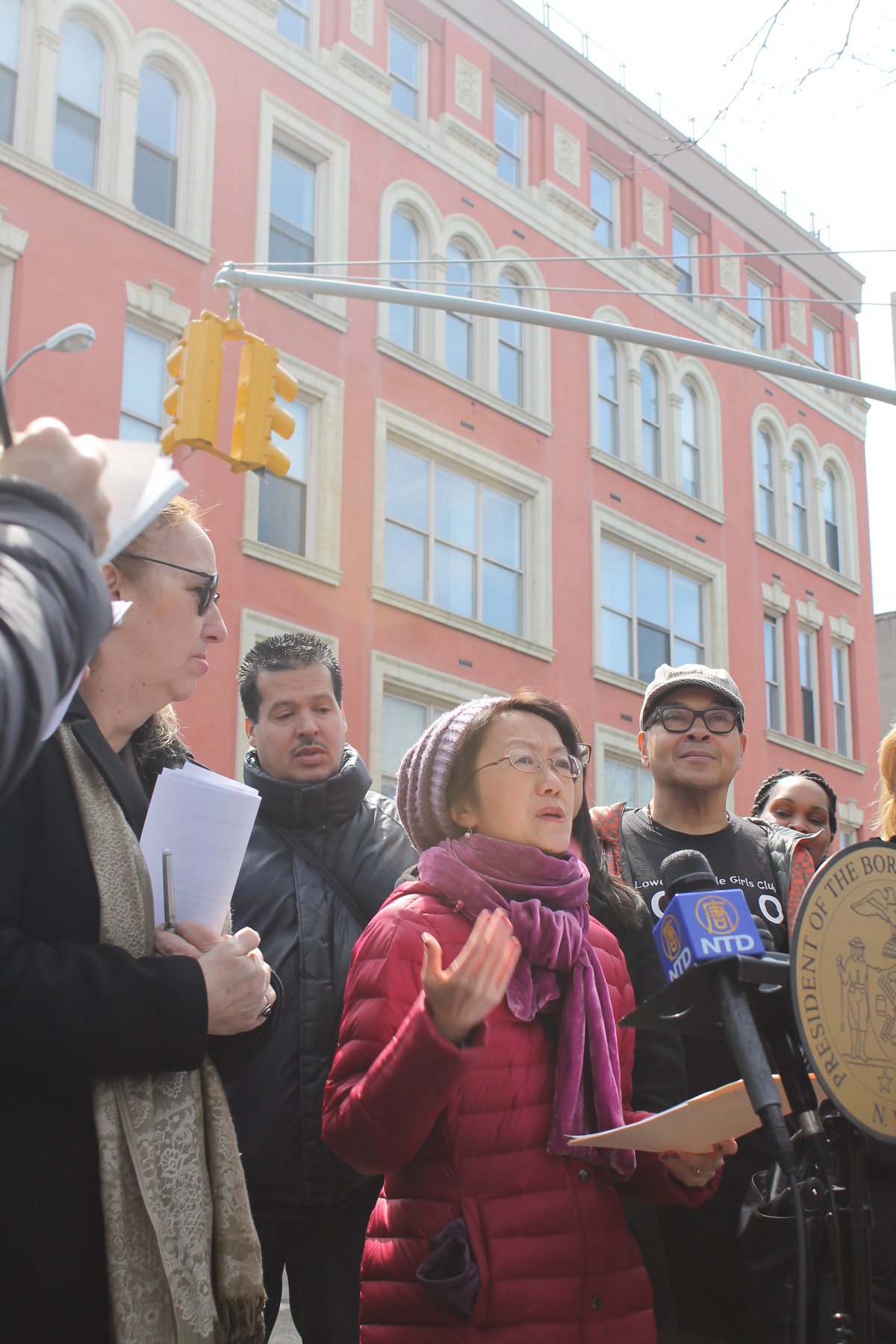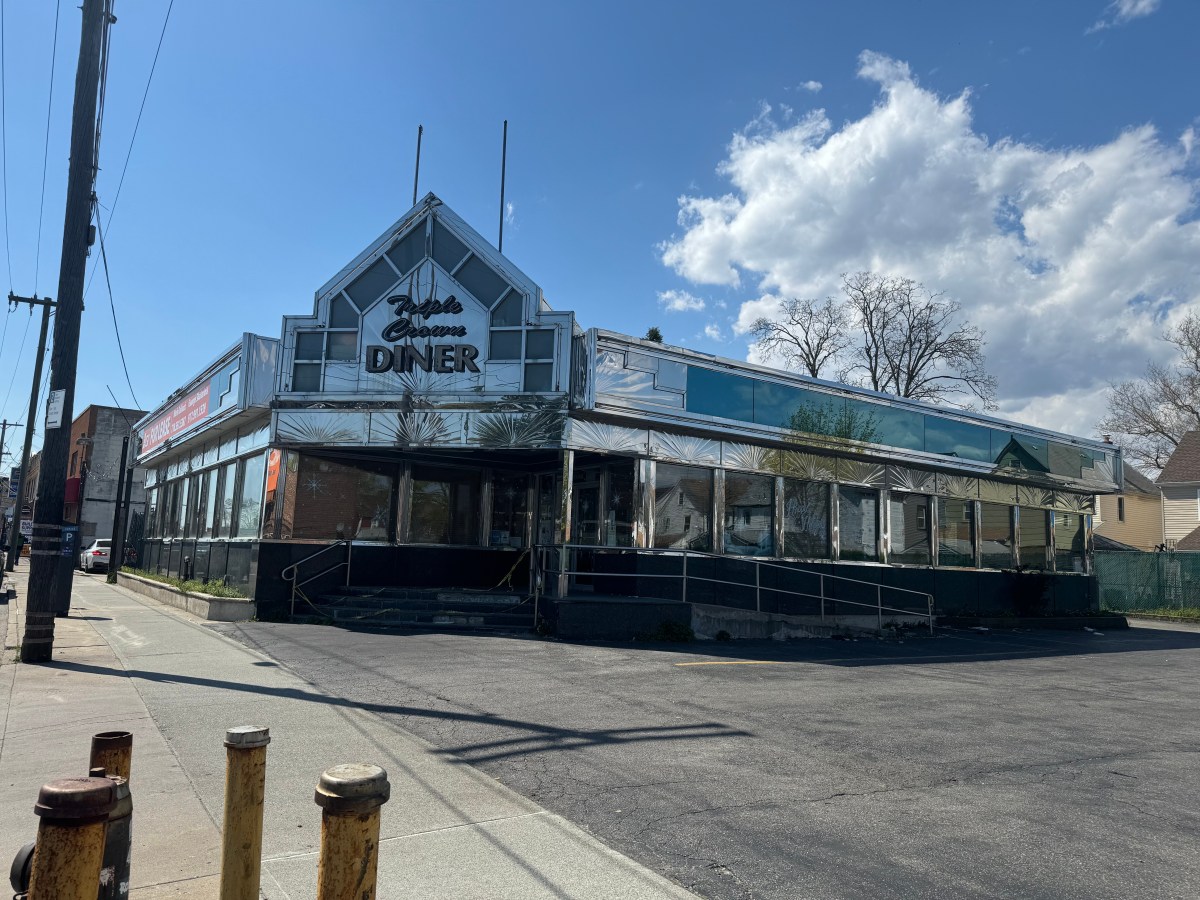BY DENNIS LYNCH | State Senator Daniel Squadron has asked the state attorney general to investigate if the Allure Group — the current owner of the Rivington House building — can be sued for defrauding the city government under the state False Claims Act. A successful suit could see the real estate company pay huge fines for its role in the sale of the former AIDS hospice to a luxury housing developer.
The False Claims Act statute allows for penalties against companies that knowingly lie to the city or state in such a way that affects payment to the government.
The Allure Group bought the former Lower East Side AIDS facility, at the corner of Rivington and Forsyth Sts., from its longtime operator, VillageCare, in 2014 for $28 million with the understanding it would become a for-profit nursing home. Rivington House had a deed restriction on the property that stipulated it must be used as a nonprofit healthcare facility. In order to lift that restriction, the Allure Group had to pay the city a percentage of the property’s value.
The Allure Group allegedly planned to flip the property to a luxury developer for $116 million, but concealed this knowledge, so that the property value was underestimated at $64 million, therefore lowering its payment to the city. The Allure Group paid the city 25 percent of that figure, or $16 million, to lift the restriction, then went ahead and sold the building to Slate Property Group for the aforementioned sum, turning a $72 million profit and robbing the neighborhood of a longtime community care facility.
Critics say the city was either aware of Allure’s plans or negligently missed key signifiers that it would happen. City government representatives, including Mayor Bill de Blasio, refuted that notion and said that Allure hid their intentions. If the state sues under the False Claims Act, it will be with the understanding that Allure knowingly misled the city government, Squadron said.
“It is critical that people who mislead the government are held accountable, and the False Claims Act is a good way to do that,” the state senator said. “It’s been repeatedly said that the city was mislead, so I hope that they do pursue a False Claims Act if it is merited.”

If found to have violated the False Claims Act, the Allure Group could be liable to pay three times the amount of the damages that the city sustained because of the fraud, plus civil penalties between $6,000 and $12,000 for each individual violation of the act. Clearly, the figure could be high, in the millions. It wasn’t clear, though, if it could be up to $48 million — based on the 25 percent “flip tax” calculation on the $64 million underestimation of the property’s value that the city did not receive. Squadron’s office did not immediately provide an answer on what the possible fine might look like.
Attorney General Eric Schneiderman’s office would not comment on Squadron’s letter. The A.G. currently has an ongoing wider ongoing investigation into the property’s sale, in which the office has said it was misled. The office claimed it had no knowledge Allure Group sought to lift its deed restriction when it was required by state law to sign off on the sale in 2014.
False Claims Act cases, in which, generally, individual whistleblowers with nonpublic information bring information to the state or federal government, are common. One attorney who handles such cases, Rachel Geman, notes that the increase in F.C.A. litigation in recent years has a number of explanations.
Those include relatively recent amendments to the False Claims Act; the push over the last decade or so for states to enact their own broad False Claims Acts (and New York has an extremely robust law); greater legal protections for whistleblowers who face retaliation; greater willingness of nongovernment plaintiffs to litigate even when the government chooses not to; and the success of very high-profile cases involving massive fraud settled or tried by the government and private whistleblowers, she said.
“People with nonpublic information involving fraud on the State of New York, or any city in the state, can bring claims under the whistleblower provisions of the robust New York False Claims Act,” said Geman, a partner at Lieff, Cabraser, Heimann and Bernstein. “The New York False Claims Act, while only about a decade old, has proved to be an important fraud-fighting tool, and many cases are filed under it.”
Many community members and local politicians want the city to some how find a way to reverse the sale and put Rivington House back either in public hands or in the hands of a developer that would develop it as a healthcare facility. K Webster, a local activist and Community Board 3 member, helps run the Neighbors to Help Save Rivington House group.
She believes a successful False Claims Act suit would “strengthen the cause.” And, while it may be a long shot, Webster believes it is possible to reverse the sale.
“The divine rights of kings were once considered immutable. I think if they could return it to the community, it might be a nice PR move for them,” she said, speaking of Slate Property Group.
Last week a new law sponsored by Borough President Gale Brewer and Councilmember Margaret Chin was signed into effect by Mayor Bill de Blasio, instituting stronger requirements — including public review — for changes on deed restrictions on city-owned properties.
“The process includes obtaining appraisals, seeking public input and conducting an extensive review prior to approving any change,” a written statement from the Mayor’s Office said. “Under the new process, requests will also be reviewed by a committee, as well as the mayor or the mayor’s designee, for a final determination as to whether the modification or removal is appropriate and furthers the best interests of the city.”
Specifically, the law will require the city to construct and maintain an online, public, searchable database of any properties with deed restrictions since 1966.
In addition, notification will have to be given to the local councilmember, community board and borough president of any deed-restriction removal request in their district.
Also under the new law, detailed standards and procedures will be set forth for the Department of Citywide Administrative Services to follow when a property owner requests that a deed restriction be modified or removed.
Furthermore, the Department of City Planning will be given a formal advisory role in DCAS’s consideration of deed-restriction modification requests, ensuring land-use decisions are made based on input from the city’s primary land-use agency.
Also, it will be required that three separate entities — DCAS, a specially formed committee and the mayor — will all independently review a request before a restriction can be lifted.
The law will also require that a list of factors be assessed to determine whether the request furthers the best interests of the city, including the potential impact of the request on the neighborhood, the availability of community-based services and affordable housing.
Finally, the mayor will be required to sign off personally on any deed-restriction removal request.
“Our city is not a playground for powerful real estate interests,” Chin said. “Every transaction that involves properties set aside for the good of the people of our city, such as Rivington House, needs to be subject to the greatest amount of public input, transparency and accountability as possible. Our legislation…achieves that goal. Today we are united with a simple message: No more Rivington Houses, not on this mayor’s, or any other mayor’s watch. I am proud to join Borough President Brewer and Council Speaker Mark-Viverito in solidarity with the Lower East Side residents who woke up one morning to find a cherished, community asset taken from them.”
Added Brewer, “Our city government failed when it did not protect Rivington House. When government screws up, it’s our first job to figure out why and make sure it cannot happen again. Today’s legislation is a strong reform package that addresses the key failures that led to the loss of Rivington House, and sets new standards for transparency, so for the first time, we’ll know where all these deed restrictions are and what they’re protecting, and gives its reforms the permanence of law, so they can’t be undone in future administrations.”

















